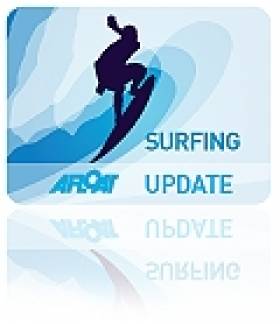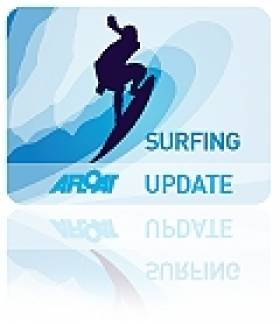Displaying items by tag: bodyboarding
Ireland's Most Decorated Surfer In Portugal For World Bodyboard Tour
#Bodyboarding - National Bodyboarding Champion Martin 'TK' Kelly is representing Ireland this week at the Portuguese stop on the APB World Tour for bodyboarding, as the Coleraine Times reports.
Regarded as the most decorated Irish surfer of all time, Kelly is flying the flag for the North Coast's dedicated surfing community among 140 of the world's best at Praia Grande.
And he's joined at the Sintra Pro by Sligo boarder and two-time Irish national champ Shane Meehan.
Though neither as expected to have a shot at the world crown, it will still be, in Kelly's words, "a fantastic experience" before he defends his Irish title in Bundoran at next week's Irish Nationals.
The Coleraine Times has more on the story HERE.
Irish Headed to Gran Canaria for Bodyboard Worlds
#SURFING - Ireland is set to field a team of Strandhill bodyboarders at the 12th ISA World Bodyboard Championships in Gran Canaria from next week.
The event will take place in the heavy slab waves of El Frontón and la Guancha at Galdar City from 30 November to 4 December 2011.
The competition also marks the first time that bodyboard-only teams from around the world will compete in the Open Men (Prone), Open Women (Prone), Under 18 Men (Prone) and Open Drop Knee divisions.
See video of action from El Frontón in 2010 below:
Portugal Takes Top Honours at Eurosurf 2011
Team Portugal were crowned European Surfing Champions at the final day of Eurosurf 2011 in Bundoran yesterday.
It's the first time the Portuguese have held the title since 1997, which is also when the event was last hosted in the Co Donegal seaside town.
Portugal won three of the seven different categories, with two second-place finishes, one third place and one fourth.
Their surfers fought tooth and nail in a week of competition that was dominated by France, who made a bold statement of intent on the opening day by scoring eight out of the best 15 waves - and led the pack until the closing sessions.
Meanwhile Team Ireland did not finish too badly, placing a respectable sixth in the final tally.
Ashleigh Smith made the biggest mark for the Irish, being narrowly beaten into second place in the women's bodyboarding division by Portugal's Catarina Sousa.
“We’ve been delighted with how the week has gone for Eurosurf," said Eurosurf press officer Shane Smyth. "If we were to draw up a blueprint for a surf competition considering waves, weather and organisation we would have nailed it."
More details of results are available on the Eurosurf website HERE.
The BBC News website also has an image gallery of the week's action HERE.
































































